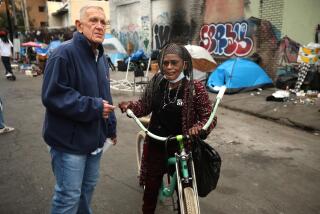L.A. Asked to OK Buildings : Advocate of the Homeless Seeks Centers for Hygiene
The organizer of Justiceville, a Skid Row shantytown shut down twice by police earlier this year, said Saturday that he wants to set up hygiene centers for the homeless on vacant land throughout Los Angeles.
Ted Hayes, a one-time minister who became “homeless by choice,” said he believes that access to portable toilets, showers and a foot-washing area could help restore dignity to homeless people and help them find jobs.
As part of the plan, Hayes and representatives of charitable groups are trying to get city permission to build geodesic dome sleeping shelters at the hygiene sites so that street people, who would be hired to maintain the centers, would have a place to live while they build a financial base and complete vocational training.
‘Homelessness Workshop’
The hygiene center plan was announced during a daylong “Homelessness Workshop” at Los Angeles Trade-Technical College. The conference, which featured a panel of community leaders concerned with the plight of the homeless, was organized “to educate people, in particular black people, that the problem of the homeless lasts past Christmas and Thanksgiving,” said workshop organizer Denise Williamson.
Advocates for the homeless currently are lobbying city and county officials to grant variances on zoning and sanitation and health and safety codes so that they can build a working model of the hygiene centers, which Hayes refers to as “Centers for Self-Empowerment of Homeless People.”
Hayes estimated that a working model of the centers could be built for about $15,000, which he said could be raised through donations.
He said he would like to see the model center built at 6th Street and Gladys Avenue in downtown Los Angeles, a former playground area that was the original site of the beleaguered Justiceville.
Evicted by Police
Sixty-three homeless people who had set up shelters there were evicted by police in May after the shantytown drew criticism for its squalor and alleged drug activity. Eighteen of the people moved their plywood and cardboard shelters to a lot at 3rd and Bixel streets.
Hayes and two other men were arrested in June when they refused to leave that site. A Los Angeles Municipal Court jury acquitted them in October of trespassing charges.
Other workshop speakers presented additional plans they hope will alleviate some of the problems homeless people face.
Matt Lyons, a member of the Homeless Organizing Team, said his group will stage a rally on Dec. 19 at the former site of Tent City, a temporary shelter set up last Christmas across Spring Street from Los Angeles City Hall. He said the group also plans a sit-in at the site from Dec. 19 through Jan. 5 and a candlelight vigil on Christmas Eve.
Protest Penalty
Lyons said his group wants the county to abolish its “60-day penalty,” under which welfare recipients must complete 20 job interviews a month and participate in county public works in order to qualify for $228 in assistance. Those who do not meet those requirements are disqualified from the program for 60 days.
“We recognize the need for rules,” Lyons said. “But there are better ways to conduct the program than throwing people onto the streets for 60 days.”
Melanie Lomax, an attorney for the National Assn. for the Advancement of Colored People, said the association is trying to organize a pool of lawyers to provide legal advice for the county’s estimated 40,000 to 60,000 homeless people.
“One of the basic obligations of local and state and federal government is to provide people with shelter and food,” Lomax said. “The perennial excuse of a lack of resources is an inadequate excuse. It’s up to us as taxpayers to see that our taxes go where they should.”
More to Read
Sign up for Essential California
The most important California stories and recommendations in your inbox every morning.
You may occasionally receive promotional content from the Los Angeles Times.










